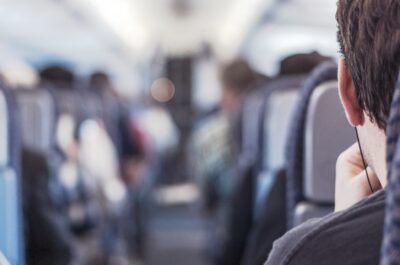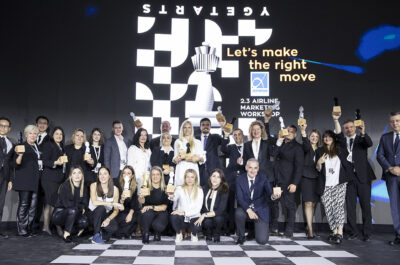Passengers recognize multiple benefits of BYOD. Even though there are various concerns about BYOD from the power consumption of personal devices to spillage of food and drinks on them, nearly three-quarters of respondents (71%) are receptive to the new initiative (with females showing a bit more receptiveness).
As airlines begin to displace in-flight entertainment (IFE) systems on seat-back screens and drop-down monitors in favor of a bring-your-own device (BYOD) model to cut costs, many critics think the disadvantages to BYOD will infuriate passengers. To determine whether this theory holds true, Osurv recently ran a mobile survey to 1,300 adult airline passengers. Despite the skepticism, a majority of passengers were actually receptive to BYOD and expressed many qualms with existing IFE systems. But before airlines realize the significant cost savings, an overwhelming number of passengers expect something in return for participating in the new program.
Passengers recognize multiple benefits of BYOD. Even though there are various concerns about BYOD from the power consumption of personal devices to spillage of food and drinks on them, nearly three-quarters of respondents (71%) are receptive to the new initiative (with females showing a bit more receptiveness).
- In citing their reason for this openness, the majority of respondents (67%) prefer to use their own high quality screens/audio, 16% expect the price of airline tickets to be reduced, and 9% prefer to forego the airlines’ potential germ-ridden devices; and
- When it comes to music, 91% of respondents prefer to use their own personal devices as opposed to the airlines’ IFE.
Seat-back IFE screens cause stress in surprising ways
As flying can be a stressful experience for passengers from turbulence to inconvenience, an airline’s IFE is commonly considered a pleasant distraction. Ironically, our study revealed that an airline’s seat-back IFE can cause the opposite reaction and increase stress levels for many passengers, lending further support to BYOD.
- 42% of respondents feel stressed when programming on the seat-back screens abruptly turns off or the resolution becomes fuzzy, even for just a couple seconds or more;
- 64% of stressed passengers entertain the thought that the IFE malfunction could signify a potential mechanical problem on the plane;
- 23% of respondents say the seat-back screens’ programming hampers their ability to fall asleep on red-eye flights; and
- 31% of passengers feel stressed when the IFE programming features an explosion or killing.
Passengers expect a portion of airlines’ cost savings
When asked for the rationale behind the airlines’ BYOD adoption, 87% of respondents view this as a cost-cutting initiative, while only 11% believe airlines desire to give passengers more control over their entertainment experience. And of the respondents who see BYOD as a cost-savings measure, an overwhelming 94% think they should benefit in some way from the cost savings (with a greater percentage of passengers at LAX and ATL airports citing this view versus at JFK). Overall, about half (52%) expect more free entertainment content, more than a quarter (27%) expect a cheaper airline ticket, and 18% expect discounted baggage fees. Clearly, most passengers believe that the BYOD cost savings should bestow some benefit to their wallets.
Key takeaways
As the airline industry quietly mounts its most significant cost-cutting campaign since tacking on fees for checked baggage and in-flight meals, an overwhelming majority of passengers are notably open-minded to BYOD. A significant number of passengers even consider IFE seat-back screens stressful in some unforeseen ways. Still, many passengers expect the cost reductions to translate into some meaningful advantages for them. Even though airlines must continue to address passengers’ perceptions of BYOD, the overall findings suggest a bright future for this emerging trend.
Theodore is the Co-Founder and Managing Editor of TravelDailyNews Media Network; his responsibilities include business development and planning for TravelDailyNews long-term opportunities.






























































































































































































































